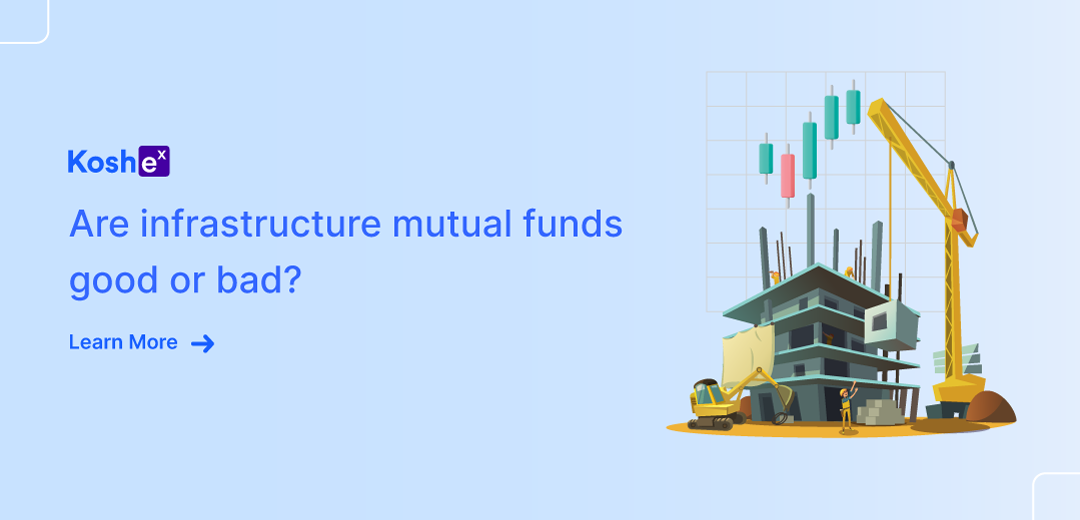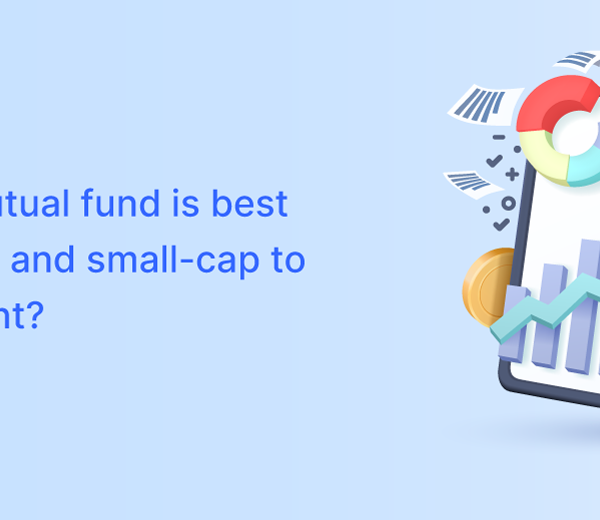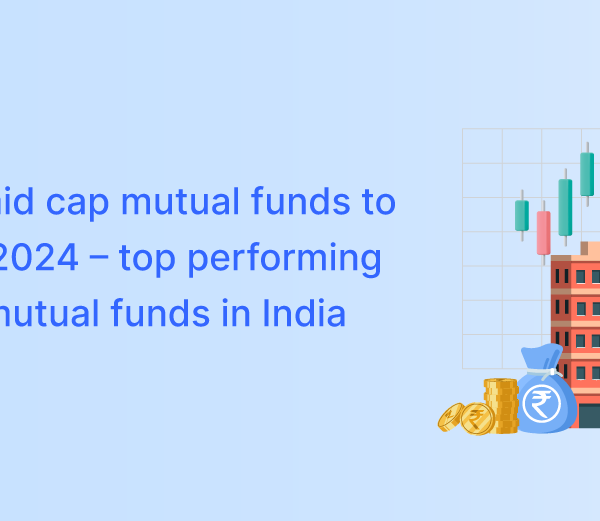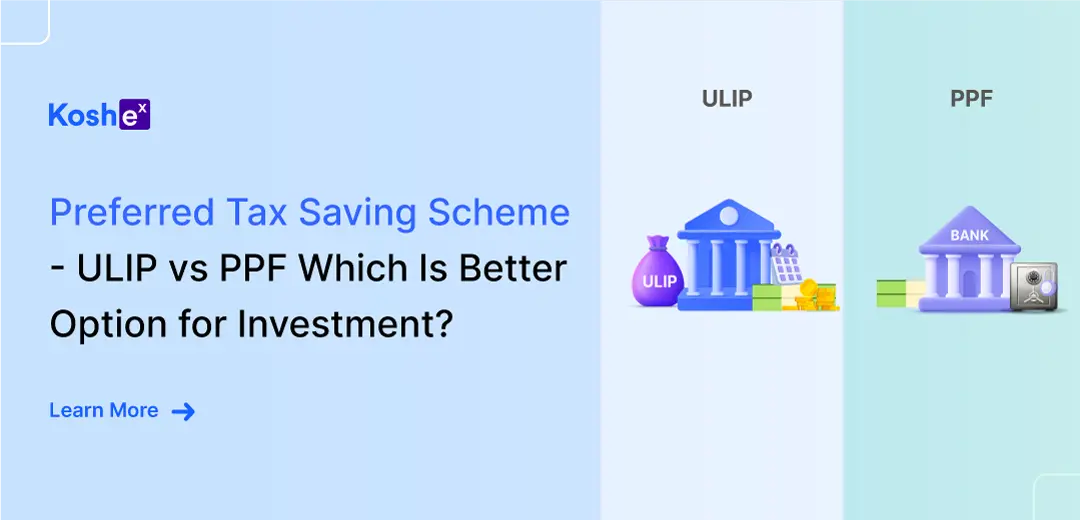Investing in mutual funds is a popular choice for individuals looking to grow their wealth while enjoying the benefits of professional fund management. The concept of mutual funds is really simple. It pools money from the investors and invests in the predetermined class of assets as per the terms of the scheme. One of the peculiar features of mutual funds is that it also operates sector-wise.
In simpler terms, mutual funds may decide to invest in companies operating in a certain specific sector like infrastructure, IT, energy, etc.
One category of mutual funds that has gained attention in India is infrastructure mutual funds. Let’s discover the world of Infrastructure funds, exploring their pros and cons, recent performance, and the factors to consider when investing in them. Find out with Koshex!
What are Infrastructure Mutual Funds in India?
Infrastructure mutual funds in India are a specific category of mutual funds that primarily invest in companies and projects associated with the infrastructure sector. This sector includes industries such as roads, bridges, airports, railways, power generation and distribution, telecommunications, and more. The primary objective of these funds is to provide investors with exposure to infrastructure-related assets and potentially benefit from the growth in India’s infrastructure development.
Pros of Investing in Infrastructure Mutual Funds
Mutual funds – infrastructure is gaining popularity, especially after India is witnessing a significant improvement in infrastructure. CNBC TV18 reported that, as per EY, infrastructure is a key enabler in helping India become a $26 trillion economy. Here are some of the reasons why you should already be investing in the infrastructure funds:
- Growth Potential: India’s infrastructure sector has grown significantly due to government initiatives and foreign investments. Investing in infrastructure mutual funds can provide exposure to this growth potential.
- Diversification: While it is a sector-specific fund, it offers diversification across various infrastructure projects and companies. This reduces the risk associated with investing in a single infrastructure company by buying its shares. Instead of investing in a single infrastructure company, you can choose to invest in a bouquet of them through an infrastructure mutual fund. The funds diversify the money into multiple infrastructure companies, ensuring diversification.
- Professional Management: Skilled and expert fund managers make all the decisions of the infrastructure funds. They have the expertise to select the right stocks and securities within the sector after performing all the crucial analyses and studying the industry and company prospects. This maximizes your returns on investment.
Precautions While Investing In Infrastructure Funds
Investing in infrastructure mutual funds comes with a variety of benefits. However, there are certain precautions that you should take to minimize your risks. These include:
- Market Volatility: Infrastructure stocks can be subject to market volatility, which can impact the fund’s NAV (Net Asset Value). You should be prepared for fluctuations in the value of your investments in infrastructure funds.
- Sector-Specific Risks: The concentrated emphasis on a particular sector exposes these funds to risks that are specific to that sector. Factors like government policies, regulatory changes, and economic conditions can affect the infrastructure sector.
- Duration: Infrastructure projects take time to develop. Thus, exiting after a short duration may not earn you much returns.
- Performance Variability: The performance of infrastructure mutual funds can vary widely based on the fund manager’s strategy and the underlying assets. Not all funds perform the same. Therefore, you should conduct thorough research before investing.
Various macro factors like government initiatives and economic conditions influence the performance of infrastructure mutual funds in India. As the government rapidly develops the infrastructure facility, the infrastructure companies are witnessing a steady rise. But, it’s essential to review the historical performance and consider factors such as expense ratios, risk-adjusted returns, and consistency in performance over time.
How Long Should You Invest?
The ideal investment horizon for infrastructure mutual funds, like other equity-based funds, is generally considered to be long-term. This negates the impact of short-term fluctuations. Infrastructure projects often have extended timelines, and it may take time for the investments in these funds to fully realize their potential. You should have a horizon of at least 5 to 7 years to weather market volatility and benefit from the growth potential of the infrastructure sector. Other factors to determine your investment horizon include your needs, preferences, and investment goals.
In a Nutshell
Infrastructure mutual funds can be a viable investment option for those looking to participate in the growth of India’s infrastructure sector. The rapid development of infrastructure in India provides a promising opportunity for you to gain through investing in this sector. However, like any investment, they come with their own set of risks and rewards. You should carefully evaluate your risk tolerance and investment horizon and perform due diligence on specific funds before making investment decisions. Another important thing is the selection of the right infrastructure fund and the right platform to invest in these funds.
Koshex has simplified mutual fund investment with 5,000+ different funds to select from. It allows you to scan through different infrastructure mutual funds and select the best one that suits your investment needs and preferences. You can invest in the best infrastructure funds by seamlessly comparing different funds across different parameters. Invest now with Koshex.
Frequently Asked Questions
Q: Are infrastructure mutual funds safe investments?
A: Like any other mutual fund, infrastructure funds also carry certain risks. Their safety and risk ratio depends on various factors like market conditions, fund managers, and sector-specific risks. You should assess your risk tolerance before investing in any mutual funds.
Q: What are the tax implications of investing in infrastructure mutual funds?
A: Tax implications can vary based on factors like the fund structure and your holding period. Long-term capital gains from equity mutual funds are eligible for tax exemptions up to Rs. 1 lakh as per the current taxation law. It’s always wiser to consult a tax advisor for specific guidance.
Q: How can I choose the right infrastructure mutual fund for my investment?
A: To maximize your gains, it is important to choose the right infrastructure mutual fund. Choosing the right fund involves considering factors like your financial goals, risk tolerance, and investment horizon. You should research the fund’s historical performance, expense ratio, and fund manager’s track record before investing. Consulting with a financial advisor can also help you make an informed decision.









Leave a Comment